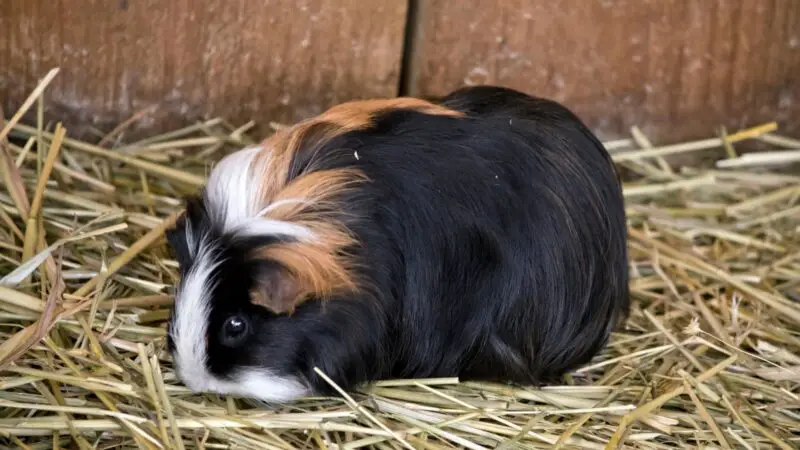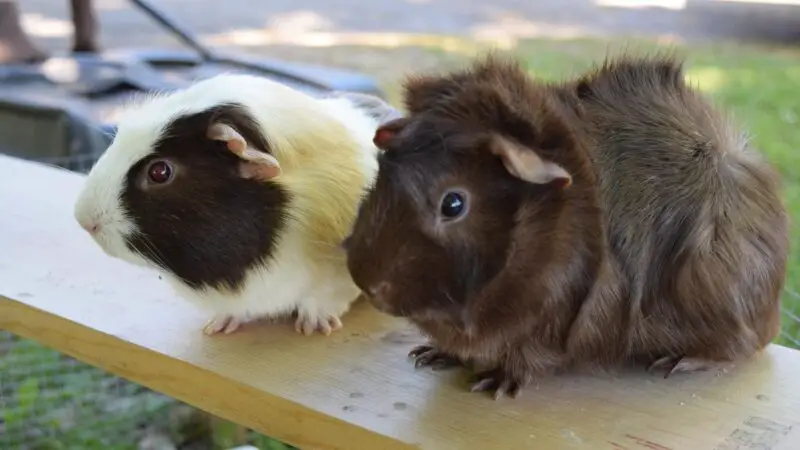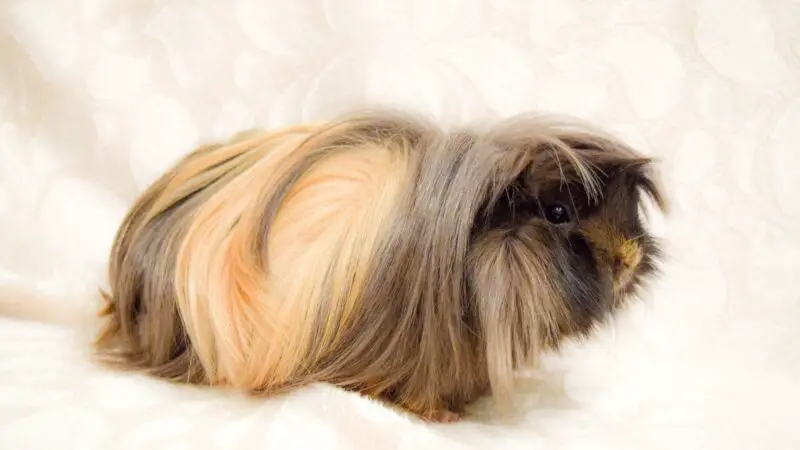Guinea pigs are not only incredibly cute and fluffy animals but they also are real chatterboxes! When people get guinea pigs for the first time, most of them are surprised by the number of different sounds these tiny cavies can make.
The majority of the time, the guinea pigs express their anticipation and gratitude with the help of different noises. Some of the sounds they make are wheeking, whining, purring, rumbling, growling, and more. You have to learn to differentiate these guinea pig sounds because you will be able to know precisely when your beloved pet is happy or when something is bothering it.
Table of Content
What Do Guinea Pigs Noises Mean?

The meaning of the noises and sounds of guinea pigs don’t depend on the breed of the guinea pig. They are pretty much universal.
Wheeking
This one is undoubtedly the most common noise that guinea pigs make. One interesting fact is that is a guinea pig’s way of talking to humans. Scientists found out that guinea pigs that are running around in the wild do not make such wheeking sounds! Only after becoming a domestic type of animal did guinea pigs start sharing their emotions with humans with the help of this noise.
Wheeking means “I am hungry!” This is what your guinea pig is trying to tell you.
Wheeking sounds exactly like you read it. For example, if a cat meows and a dog woofs, then a guinea pig wheeks. If it has always been hard for you to hear what kind of bird is singing outside and you can’t understand the difference between squealing and whining, don’t panic. It is easy to connect this common guinea pig noise to a specific situation.
You might have the meals for your guinea pig scheduled. For instance, you like to treat the little one around 9 a.m. Guinea pigs genuinely are animals of habit. If you have forgotten to feed it at 9 a.m., it will make sure to remind you about that by wheeking. Moreover, if the guinea pig is hungry, it can start wheeking extremely loudly. That is precisely how you can figure out what this noise sounds like.
Guinea pigs can be wheeking from anticipation as well. If you are coming up to them with food in your hand, wheeking, in this case, will mean genuine excitement. This vocalization might sound like a whistle or a long squeal.
Whining
Make sure to pay extra attention to this sound, as this is the primary way guinea pigs express their frustration. Whining sounds like a high-pitched moan, not entirely pleasant to hear. This sound is vital for you as an owner as this is how your pet will be showing that it doesn’t like what you are doing right now.
For instance, it might start whining if you pick it up. The best way out is to just leave the guinea pig alone if it doesn’t like getting picked up. Whining can also be addressed to other guinea pigs. If one animal was having a rest and the other one started bothering it, it’s guaranteed that the poor sleepy guinea pig will start whining.
Growling
Just like whining, growling is more of a ‘negative’ sound. When it comes to an understanding of what guinea pigs’ noises mean, you have to consider growling. It sounds like a quiet ‘grrrr.’ This growl means that your poor guinea pig is sensing a threat.
If you have a few guinea pigs and you hear one of them growl, that means there is not enough room in the cage for both of them and one of the guinea pigs feels like its territory is being threatened.
Your little friend may start growling as an answer to different changes. That involves both its surroundings and diet. Any kind of change can affect their emotional state, even merely moving the cage to another corner.
To calm your guinea pig down a little try petting it on the back for a few minutes. Eventually, the growling can turn into a purr.
Purring
Guinea pigs do not purr like cats. In fact, all the noises that cavies make are unique simply because the anatomy of a guinea pig’s throat is different from that of a cat.
The purring noise sounds like a low, long sound. It can be compared to something between a dog’s quiet grumble and a cat’s low purr. Guinea pigs usually purr when they are content and happy. You can hear it when you are gently petting your little friend.
There are different types of purring and not all of them are positive ones. Depending on the pitch of the purr and the body language of the animal, this sound can also mean that the guinea pig is annoyed. If the poor guy is high pitch purring and you feel that the guinea pig is tense, the chances are high that something is disturbing it.
Rumbling
The rumbling is the sound of love for guinea pigs. It is similar to a purr but a bit deeper and with vibration. If you have only one guinea pig, you might never hear this noise. But if you are a proud owner of a boy and a girl, then you will surely hear it during this specific period.
The male guinea pig will use rumbling to attract the girl. The boy will also start to ‘dance’ around the sow. So if you have a chance to witness the whole process, it surely is a fun experience but the rumbling sound is not an exclusively male vocalization. Females can also rumble in such a way they are saying to their partner that they are ready to take their relationship to the next level.
Chutting
The truth is that only some owners get to hear this noise. Don’t worry if you ever do hear it because there is nothing wrong with your precious cavy.
If a guinea pig chuts, it means that the animal is happy and content. Sometimes when you stroke your guinea pig, you might hear it not only purring but also making other noises. That noise can sometimes be chutting.
Teeth Chattering
If your guinea pig rapidly squeaks and shows you its teeth in the process, as if it is yawning, that means that it is teeth chattering. If the guinea pigs could speak this kind of noise, it would undoubtedly say “back off.” It shows that the guinea pig is unhappy and angry.
Chattering might occur if you have more than one guinea pig, especially during the introductory part between them. If you have bought a new guinea pig, the ‘old’ ones might want to defend their territory. That is precisely what teeth chattering would mean in such a situation.
Eventually, the guinea pigs will get used to each other and will stop making this noise. If you happen to have two males, then the sound might occur from time to time as the little guinea pigs would surely want to show each other who is the boss.
Make sure to separate the two guinea pigs that start teeth chattering as they might get involved in a fight and hurt one another.
Related: Why Are My Guinea Pigs Fighting? | Reasons and Steps to Stop Them
Shrieking
Shrieking is like a sharp cry, an alarming and frightening sound. The chances are close to 100% that something awful is happening to your beloved guinea pig. So you have to drop whatever you are doing and run to him.
It is difficult to mistake this high-pitched, loud squeak with anything else. It is a signal of danger, fear, or pain. If you are a good owner and take great care of your guinea pig, you might never hear it. In case you ever hear this sound, it is vitally important to check on your guinea pig to figure out what’s the cause of the noise.
If you have a few animals, for example, they might sometimes get into a fight. When one cavy bites another, it may start shrieking.
Bear in mind that your guinea pig might start making this noise if you decide to attend the vet, especially, for the first time. There is only one thing you can do. Try calming the poor guinea pig down and being there for it. The more visits you pay to the vet, the less stress it will cause to your guinea pig, as it will just get used to the whole process.
Other Uncommon Guinea Pig Noises

There are many different sounds that guinea pigs can make but they aren’t as common as purring. If you are familiar with all the noises mentioned above, congratulations! You already are a guinea pig owner with impressive knowledge about your beloved pet.
But if you want to go the extra mile when it comes to finding out what guinea pigs’ noises mean, then keep on reading. Now we are going to discuss the sounds that are not very common and the ones that are not as important as something like shrieking.
- Cooing – Cooing is a sound that a sow (female guinea pig) can make towards her babies. It sounds a bit like the murmuring of a soft vocalization that doves make. Mothers can use cooing to reassure their babies and to convince them that everything is alright. However, you have to bear in mind that not only mothers can make such a sound.
- Hissing – It is similar to the one that cats sometimes make. Hissing in guinea pigs is a sign that the animal is upset about something.
- Chirping – It has been proven that guinea pigs can chirp like birds (extremely rarely). Sometimes a guinea pig can fall into a state that looks like a trance. That is precisely when these chirping sounds can be heard. But no one will be able to tell you for sure what this ‘song’ mean and why guinea pigs ‘sing’ it.
The Body Language of Guinea Pigs

You will be able to understand your little friend better if you also learn to decipher the guinea pigs’ body language. Different actions on their own can mean a lot but body language can also be beneficial when it comes to an understanding of what guinea pigs’ sounds mean.
When you understand the body language of your beloved pet, you will be able to tell with nearly a 100% guarantee what kind of emotion your guinea pig is experiencing at the moment. So let’s start with the body language of guinea pigs.
- Touching noses – When these animals touch noses it means that they are greeting each other.
- Tossing its head in the air – This will usually happen while you are petting the guinea pig or at least trying to. Because by throwing its head in the air, your fluffy friend is trying to tell you that it has had enough and you better let it mind its own business.
- Popcorning – If you have been an owner of this furry ball for at least a few weeks, the chances are high that you have already seen your pet rapidly hop up in the air. Such an action reminds me of popcorn flying around in a microwave. This sweet action means that your beloved guinea pig is excited and happy. It might also be in the mood to play around a little.
- Sniffing – Sniffing is a way of finding out what’s going on. The little lads sniff the air, each other, you, their food, bed, and other different things. Such an action proves to us yet again that guinea pigs are extremely curious animals.
- Strutting – Strutting means walking around stiffly and in an arrogant manner. Guinea pigs can be doing that for two reasons. It is either the mating season when one cavy is trying to ‘dance’ in front of the other or it can be a sign of aggression, especially, if there is a new neighbor in the cage.
- Freezing – You can sometimes find guinea pigs standing motionless. That doesn’t necessarily mean that something is wrong. If the animal is merely uncertain about something, it prefers not to move for a while until it figures out what its further actions should be.
Summary
Now, you are ready to come up to your beloved guinea pig and actually understand what is on its mind. You have learned what guinea pig noises mean and that surely will help you on your road to becoming the best guinea pig owner in the world.
List of Sources
The Whistles of the Guinea Pig: An Evo-Devo Proposal
Representation of Species-Specific Vocalizations in the Medial Geniculate Body of the Guinea Pig
Cortical Representation of Species-Specific Vocalizations in Guinea Pig
Individual Differences in Infant Guinea Pig Pups Isolation Whistles
Guinea-Pig Vocalizations: Their Structure, Causation and Function
